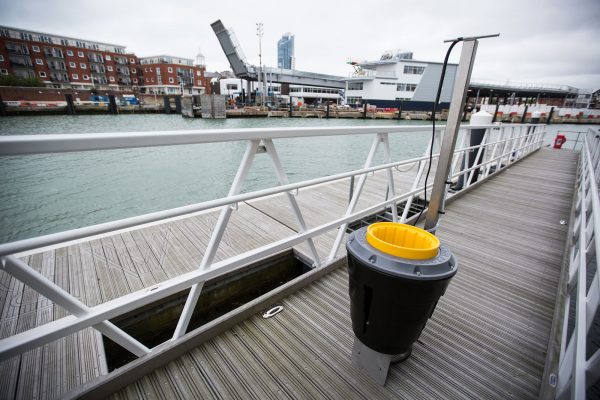A new ‘Sea Bin’ is to be trialled as part of the city’s ongoing commitment to tackle plastic pollution.
A Sea Bin is a floating rubbish bin that can capture annually 90,000 plastic bags, 35,700 disposable cups or 16,500 plastic bottles. It is one of the latest projects to be developed to support the Plymouth, Britain’s Ocean City Plan for Plastics, led by the city’s Plastics Taskforce which is made up of a range of local partners.
Queens Anne’s Battery Marina has agreed to host the trial of the Sea Bin to determine how beneficial it could be in Plymouth and will work in partnership with the University of Plymouth and Plymouth City Council to monitor collections of plastic and other waste.
Councillor Sue Dann, Cabinet Member for Environment and Street Scene for Plymouth City Council, said: “We are delighted to be able to start this new Sea Bin trial with local partners as part of our ongoing work to tackle plastic pollution and to help protect our local marine life. Cleaning up and improving the quality of our oceans is especially important to us in Plymouth as we are aiming to be the UK’s first National Marine Park.
“This will be one of the first few Sea Bins in the UK, so although others are in the pipeline, this really does mean Plymouth is at the forefront of using this innovative technology in the UK.
“Marinas and Ports are ‘hots spots’ for litter that enter the system via users on the water, surrounding waterfront areas and by drifting in from surrounding seas driven by tides, currents and wave action. The installation of a Seabin has the potential to remove marine litter from a marina at a centralised point.
“If marine litter such as plastics are not removed then they will eventually sink and very slowly breakdown into microplastics creating further environmental issues.”
Chris Price, manager, Queen Anne’s Battery, said: “We’re delighted to install a Sea Bin at Queen Anne’s Battery. Currently our staff remove any debris out of the marina with a net, making sure that we do our part in keeping the sea clean, and obviously our berth holders and visitors happy.
“We’re going to locate the Sea Bin behind the pontoons. We’ll be there giving it a daily clean-out to make sure that any plastic, bottles, and bags etc are kept out of our beautiful waters.
“All of us at MDL are really excited about any innovation which helps the environment, we’re delighted that QAB has been chosen for this project.”
Professor Richard Thompson OBE, Head of the International Marine Litter Research Unit at the University of Plymouth, said: “The key solution is, of course, to stop allowing plastic waste to enter the sea in the first place. However, steps to remove litter effectively from the ocean are important too, and we are collaborating in the project to help evaluate the efficiency of this device.”
There are four main principles in the Plan For Plastics, which are:
Avoid – encouraging residents to avoid single use plastics, and to find alternatives such as reusable coffee cups
Recycle – continue to work to increase recycling rates in Plymouth
Innovate – support academic and industry led research into plastic free alternatives.
Connect – developing an education programme to encourage people to visit and connect with the natural environment.
The Sea Bin trial will report back at the end of September with some initial results. They will be used to determine what happens next but is it is successful we would investigate further options for installing the bins in other areas across Plymouth’s waterfront.
Find out more about Sea Bins here.
